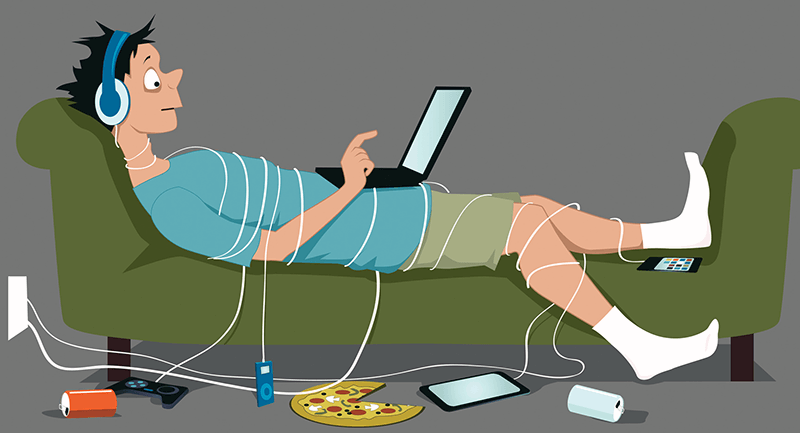Table of Contents
Today, phone dependence has become a pervasive issue affecting individuals of all ages and backgrounds. The constant presence of smartphones and the allure of social media platforms have created a society increasingly reliant on technology for social interaction, entertainment, and productivity. As a result, many people struggle to unplug from the digital world and regain a sense of presence in their everyday lives. In this blog, we will explore the phenomenon of phone dependence and discuss strategies for combating this pervasive issue to live a more balanced and fulfilling life.
Are You Constantly Connected? Phone Dependence
Phone dependence, sometimes called nomophobia (the fear of being without a mobile phone), is the excessive and problematic use of smartphones that can negatively impact daily life. This dependence can manifest in various ways, from feeling anxious when separated from your phone to letting phone use interfere with work, sleep, or social interactions.
Assessing the Scope: Understanding Our Reliance on Smartphones
In today’s fast-paced world, smartphones have become an integral part of our lives, offering unparalleled convenience. From communication to entertainment, these devices play a crucial role in our daily activities. However, it’s important to assess the scope of our reliance on smartphones and understand the potential consequences, without judgment.
Factors to consider include:
- Dependency: Understanding how much we rely on smartphones for various tasks.
- Impact on social interactions: How smartphone usage affects face-to-face communication and relationships.
- Health implications: Exploring the potential physical and mental health effects of excessive smartphone usage.
By evaluating these factors, we can better understand the role smartphones play in our lives and make informed decisions about their usage.
The Psychology of Screen Addiction: How Digital Devices Hook Us
In today’s digital age, screen addiction has become a pressing issue, and understanding the psychology behind it is crucial. Digital devices have a way of hooking us in with constant notifications, endless scrolling, and instant gratification. The dopamine rush we get from these devices plays a significant role in our addiction, as our brains crave the quick rewards. This addiction can have detrimental effects on our mental health, productivity, and relationships. It’s essential to be mindful of our screen time and take steps to break free from this harmful cycle.
Strategies for Mindful Tech Use: Creating a Balanced Digital Life
In today’s fast-paced world, it can be challenging to maintain a healthy balance between our digital devices and our personal lives. However, it’s essential to prioritize mindful tech use in order to foster a balanced and fulfilling existence. By incorporating intentional strategies such as setting tech-free zones, scheduling regular digital detoxes, and practicing mindfulness while using technology, individuals can cultivate a more harmonious relationship with their devices. Mindful tech use can lead to improved mental well-being, enhanced productivity, and deeper connections with others, offering a brighter, more fulfilling future.

From Virtual to Reality: Re-engaging with the World Around Us
After spending so much time in the virtual world, it’s time to re-engage with the natural world around us. The constant use of technology and social media has led to a disconnection from our surroundings. Still, it’s not too late to change that. Here are some steps to help bridge the gap between virtual and reality:
- Awareness:
Recognize the time spent on virtual platforms and their impact on real-life interactions.
- Limit Screen Time:
Set boundaries for the use of technology and allocate specific times for engaging in real-world activities.
- Explore Nature:
Spend time outdoors, reconnect with nature, and appreciate the world’s beauty.
Digital Detox: The Journey Towards Reclaiming Your Time and Focus
In today’s fast-paced, technology-driven world, it’s easy to become consumed by digital distractions that steal our time and focus. However, embarking on a digital detox can be the first step towards reclaiming control over our lives. Deliberately disconnecting from screens and devices, we can rediscover the joy of living in the moment, cultivating meaningful relationships, and pursuing our passions.
The Importance of Disconnecting
Recognizing that constant connectivity can harm our mental, emotional, and physical well-being is crucial. Research has shown excessive screen time can increase stress and anxiety and decrease productivity. By disconnecting from our devices, we can create space for introspection, creativity, and authentic connections with others.
Setting Boundaries: The Role of Policies and Education in Moderating Phone Use
The pervasive use of smartphones has led to a need to set boundaries to maintain a healthy balance. Policies and education are crucial in moderating phone use, especially in educational and professional settings. By implementing clear guidelines and providing education on the impact of excessive phone use, individuals can better understand the importance of setting boundaries.
“The key to managing phone use lies in setting clear and firm boundaries.”
The Impact of Excessive Phone Use
Excessive phone use can lead to decreased productivity, disrupted personal relationships, and negative impacts on mental health. Recognizing the potential consequences and taking proactive steps to address them is essential.


